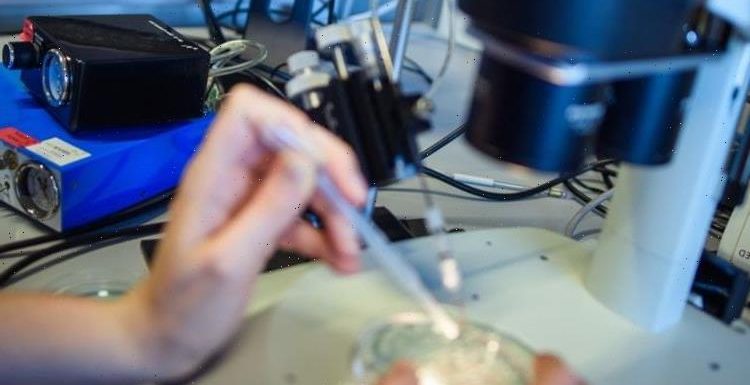
DNA testing process detailed by genetics expert
We use your sign-up to provide content in ways you’ve consented to and to improve our understanding of you. This may include adverts from us and 3rd parties based on our understanding. You can unsubscribe at any time. More info
This “Swiss army knife” is an advancement of the technology known as CRISPR gene-editing procedure. It was first developed in 2012 and has been called one of the most powerful medicinal tools in history. It works by cutting out select sections of DNA. Experts agree that there is huge potential in CRISPR as an effective treatment, but problems have arisen from the size of Cas9 – a bacteria-derived enzyme that cuts and replaces faulty genes. It is too big to be packaged conveniently, which scientists say puts limits on its potential.
This is why CasMINI, a smaller relative of Cas9, is what researchers have been prioritising for years.
A team of researchers from Stamford University made the pint-sized enzyme called Cas14, which is half the size of Cas9.
But Cas14 does not work in mammals, so the Stamford team genetically manipulated the enzyme to fix this problem and called it CasMINI.
Dr Lei Qi, from the research team at Stamford who worked on this project, said: “There were previous efforts from others to improve the performance of working CRISPRs. But our work is the first to make a non-working one working,”


Senior author professor, Stanley Li, added: “This is a critical step forward for CRISPR genome-engineering applications.
“The work presents the smallest CRISPR to date, according to our knowledge, as a genome-editing technology.
“If people sometimes think of Cas9 as molecular scissors, here we created a Swiss knife containing multiple functions.
“It is not a big one, but a miniature one that is highly portable for easy use.
“It is on our wish list that it will become a therapy to treat genetic diseases, to cure cancer, and to reverse organ degeneration.”

CRISPR technology is recognised as a serious game-changer in the medical field.
That’s why last year Professors Emmanuelle Charpentier and Jennifer Doudna, who co-discovered Cas-9, won the Nobel Prize in Chemistry last year for their work in the field.
But so far, the use of CRISPR on humans has been heavily limited by small range of studies.
DON’T MISS
There is ‘only’ one Covid symptom more commonly reported in jabbed [INSIGHT]
Millions of kids have never had an eye test [REVEAL]
How to live longer: Where you live matters, study finds [STUDY]


Some people are nervous about the possible long-term effects of this type of technology, with safety and the ethical implications being of particular concern.
There have been some examples of the illegal use of CRISPR, like the disgraced scientist He Jiankui, who used Crispr on the embryos of two unborn twin girls in an attempt to make them HIV resistant.
But scientists are still desperate to use this technology to combat some of the world’s most problematic diseases.
CRISPR has also been used for other purposes, like when miniature brains grown in the lab were genetically altered by CRISPR to help reveal how modern humans survived when other hominies like Neanderthals died out.
The study was published in the journal Molecular Cell.
Source: Read Full Article